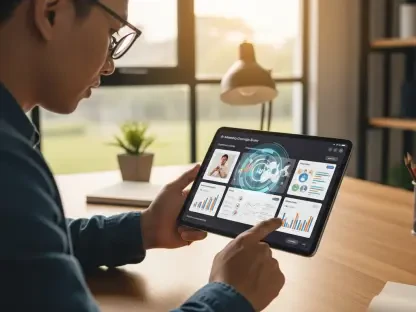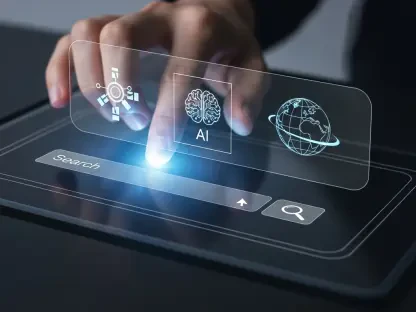Artificial intelligence (AI) is rapidly redefining business-to-business (B2B) marketing, ushering in a transformative era underscored by automation, personalization, and predictive analytics. As businesses grapple with increasing economic pressures, AI emerges as a pivotal tool, reshaping marketing strategies toward efficiency and creativity rather than routine operations. The landscape of B2B marketing has evolved significantly, with AI playing a critical role in optimizing resource allocation, enhancing customer engagement, and predicting market trends. Embracing AI technology is no longer just an innovative step but an essential strategy for companies aiming to thrive in an ever-competitive environment.
The Current State of AI in B2B Marketing
AI is currently a significant force in B2B marketing, altering how businesses plan and execute their marketing strategies. As of now, AI is indispensable, helping companies streamline operations and allocate resources more strategically. Economic conditions, such as heightened interest rates and reduced funding prospects, compel businesses to focus on enhancing efficiency rather than pursuing unchecked expansion. AI drives this shift by automating mundane tasks, allowing marketing teams to concentrate on creative pursuits and strategic initiatives. In doing so, AI not only helps maximize output but also reduces operational costs, making it an invaluable asset in today’s market.
The widespread adoption of AI in B2B marketing has fundamentally changed pre-AI marketing practices, which were often labor-intensive and less efficient. Tasks such as drafting follow-up emails, scoring leads, and updating customer relationship management (CRM) systems were performed manually and required significant resources. With AI, these tasks have become more streamlined and efficient, providing marketing teams with the ability to score leads automatically based on web activity and interaction data. This automation allows marketers to engage in high-value activities and focus on strategy development. AI tools offer valuable insights into prospected conversions, empowering marketers to craft personalized outreach strategies that significantly improve engagement.
Work Smarter With Automating Repetitive Tasks
AI’s ability to automate repetitive tasks in marketing is central to its transformative role in this industry. By taking over tasks that were previously manual, AI liberates human resources to focus on more strategic endeavors, enhancing productivity and creativity. Beyond its impact on marketing departments, automation techniques extend to other sectors, such as finance, where AI tools facilitate processes like procure-to-pay (P2P) by eliminating manual invoice processing and approval workflows. This automation enables companies to achieve higher accuracy, efficiency, and cost-effectiveness. In the realm of marketing, AI has significantly changed lead scoring and email campaigns, streamlining operations that were once resource-intensive.
The influence of AI on email marketing is noteworthy, with technology enabling highly tailored subject lines, optimally timed dispatches, and personalized content based on previous customer interactions. AI systems help marketing teams understand inbox response patterns and adjust outreach frequency to avoid email fatigue, ultimately enhancing response rates. Moreover, AI-powered automation ensures accurate CRM management, automatically updating data and tracking client interactions. As a result, marketers save time, maintain consistency in customer interactions, and minimize missed opportunities. By automating these processes, companies not only achieve greater efficiency but also witness improved conversion rates and customer satisfaction.
Reach Customers With Hyper-Personalization
AI’s capability for hyper-personalization is revolutionizing B2B customer engagement. Unlike traditional personalization methods, which often included simple techniques such as using a recipient’s first name, AI enables marketers to offer deeply customized experiences on a massive scale. This capability matches messages and content to fit individual preferences, driving more meaningful connections with customers. AI-powered chatbots epitomize this transformation, offering more than just replies to frequently asked questions. They analyze a user’s browsing habits, past behaviors, and real-time preferences, providing timely and relevant responses. Such personalized interactions foster stronger customer relationships and enhance overall engagement.
Websites have also been revolutionized by AI, becoming more dynamic as they adjust content according to detailed visitor profiles. For instance, a marketing manager browsing a website might encounter case studies specific to his industry, while a sales director might be drawn to content focused on expedient funnel strategies. These personalized experiences, generated in real-time by AI technologies within content management systems, offer each visitor a unique journey tailored to their professional needs. Furthermore, AI enables hyper-personalized email marketing, suggests auto-generated content recommendations, and curates individualized ad experiences that align with a prospect’s buyer journey. As AI continues to develop, companies must adopt these strategies or risk falling behind competitors accustomed to personalized client interactions.
Forecasting The Future With Predictive Analytics
Predictive analytics is another transformative aspect of AI in B2B marketing, providing businesses with the power to foresee future customer behaviors with unprecedented accuracy. This capability is particularly important in highly competitive markets where anticipating customer actions can give a company a distinct advantage. AI models meticulously analyze vast data sets, including past behaviors, engagement metrics, and prevailing industry trends, allowing marketers to identify potential leads that are most likely to convert. This insight significantly enhances the refinement of marketing strategies, as marketers can prioritize high-potential leads, thus minimizing the risk of opportunity loss to competitors.
Predictive analytics empowers sales teams with valuable foresight, enabling them to engage prospective leads proactively, even before a purchase decision has been clearly expressed. By leveraging AI-driven data insights, companies can craft and implement highly effective marketing strategies that resonate with potential clients. As a result, businesses not only achieve higher conversion rates but also optimize resource allocation, focusing their efforts on the most lucrative prospects. Companies taking advantage of predictive analytics are better positioned to cater to market demands, outperform their competitors, and maximize their marketing efforts’ impact in the ever-evolving business landscape.
The Future of AI in B2B Marketing is Here. What’s Next?
Artificial intelligence (AI) is swiftly altering the dynamics of business-to-business (B2B) marketing, introducing a new era marked by automation, personalization, and the use of predictive analytics. In the face of rising economic pressures, AI stands out as a vital resource, steering marketing strategies away from mundane routines towards more efficient and innovative practices. The B2B marketing landscape has undergone a profound transformation, with AI at the forefront, driving the optimization of resource allocation and bolstering customer engagement. Moreover, AI’s ability to forecast market trends offers businesses a competitive edge, making its adoption not merely an innovative move but a crucial strategy for survival and growth. Companies that leverage AI effectively can enhance decision-making processes, streamline operations, and better anticipate consumer needs, positioning themselves strongly in an increasingly competitive market. In essence, AI is becoming indispensable for companies aspiring to lead and succeed amidst evolving business challenges.









